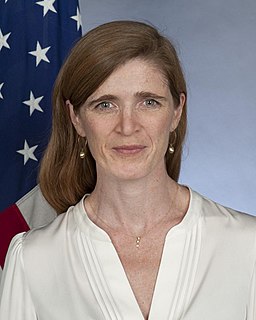By Tasha Dowbachuk | Published by November 12, 2019
A former U.S. Ambassador to the United Nations addressed the Kean community with a reflection of human rights through her engagement in American politics.
Samantha Power, an internationally recognized influential leader, presented in the Distinguished Lecture Series on Oct. 28 in Kean University’s STEM Building.
Inside the development of her presentation, “The State of The World: Challenges and Opportunities,” Power introduced three central ideas: the role of technology in domestic politics, the question of whether democracy is facing danger, and shrinking the change.
Through Power’s discussion of national security and foreign policy in the navigation of diplomacy in the future of human rights, the importance of leadership is emphasized through her chronicles of advocacy in the themes presented in democracy.

Photo by Tasha Dowbachuk
Power also provided insight into her latest New York Times bestseller “The Education of an Idealist” while discussing her progression in politics.
After covering the Yugoslav Wars as a war correspondent, Power later became the first Anna Lindh Professor of Practice of Global Leadership and Public Policy at Harvard Kennedy School and Harvard Law School. Through her engagement in international politics, her strides lead her into becoming the senior foreign policy advisor of U.S. Senator Barack Obama during his 2008 presidential campaign.
As an Irish immigrant who grew up in the U.S., Powers’ involvement in foreign policies has influenced her approach to handling refugee processing procedures as well as discussion about minority groups.
“One of my favorite things in the Obama administration was seeing CIA Director John Brennen at the White House during Obama’s second term wearing pride colors,” Power said.
In 2002, Power released her Pulitzer prize-winning book “A Problem From Hell” which illustrates the examination of how America has turned a blind eye to the country’s repetitive failures in ending genocide.
“The human rights policies of foreign governments are not of much interest to our current administration,” Power said. “So I’d say we walked away from alliances and from the integration of human rights and our values in the conduct of our foreign policy.”
As the former human rights advisor to Obama, Power emphasized that the previous administration was not “perfect” in its efforts to course through the process.
“I had a front-row seat to how difficult it is to integrate human rights at the highest levels,” she said. “But we have never gone through a period where there’s such affection shown for abusive leaders without seeming regard for human rights at all.”
While discussing the impact of technologies in relation to the rights of marginalized groups around the world, such as Burma with surfacing violent hate-speech from Facebook, Power also reflected on the Russian infiltrations within social media platforms such as Facebook and Twitter.
Discussions upon the prevalent events in China, through the operation of buying pre-existing social media accounts from YouTube and Facebook to spread misinformation in order to discredit the Hong Kong critics, protesters, and citizens surfaced in the presentation.

Photo by Tasha Dowbachuk
“None of the actors in our democracies are going to take these issues as seriously as they might unless all of us are raising our voices and demanding that the human consequences of the platforms are taken into account,” Power said.
Power expressed that the “durability of liberal institutions, the status of science as a foundation for the decision-making in government, and the attachment to facts” has been taken for granted in democracy and became much more “imperial” due to the reality of the nation becoming “more divided.”
“I think it’s really important to take note of the potential regime for resilience and the ability to deliver for one’s people, [where] the possibility of self-renewal of democracy should be taken over the alternative model of counter-trends,” Power said.
In spite of the unknown, the idea of being the change to advocate for the liberation of our nation is encouraged by becoming the change through the means of action.
“My message to reach and assure Kean University students is that everyone feels like they are just one person,” Power said. “Even Barack Obama when he was president felt that way.”
The fight for equality and human rights continues and Power notes that it’s important to shine a light on abuses within its earliest stages.
“The only way you can make a dent in any of the challenges is if lots of people can overcome that inhibition and do their best to make a small difference,” she said

You must be logged in to post a comment.